A bachelor and master degree combined program could jumpstart your college studies and get you started on the path to a rewarding career.

In one of these programs, you can gain a thorough education in your field and add two college degrees to your resume.
Editorial Listing ShortCode:
Combined programs are a big commitment, but they’re just right for many driven, ambitious students. Let’s take a look at the many benefits of a joint degree.
Bachelor and Master Degree Combined Programs
If you want to get ahead in your chosen field, combined bachelor’s and master’s degrees may be able to help. Whether online or on campus, some of the classes you take can count toward both programs. Because of that, you’ll often be able to graduate with two degrees in less time—and for less money—than if you were to earn each degree separately.
Select the program that most interests you to jump to that section of the guide:
- Bachelor’s in Accounting / Master’s Accounting
- Bachelor’s in Business / MBA
- Bachelor’s in Chemistry / Master’s in Chemistry
- Bachelor’s in Communication Studies / Master’s in Communication Studies
- Bachelor’s in Computer Science / Master’s in Computer Science
- Bachelor’s in Criminal Justice and Criminology / Master’s in Criminal Justice and Criminology
- Bachelor’s in Economics / Master’s in Economics
- Bachelor’s in Information Systems / Master’s in Information Systems
- Bachelor’s in Mathematics / Master’s in Mathematics
- Bachelor’s in Public Health / Master’s in Public Health
You can explore these programs to see which ones best match your interests and goals.
Bachelor’s in Accounting / Master’s Accounting

Many accounting undergraduate students have the goal of becoming a certified public accountant (CPA), but that typically requires more education than you’ll earn in a bachelor’s program alone. Fortunately, on-campus or online master’s degrees combined with a bachelor’s can provide just the right number of credits.
Editorial Listing ShortCode:
As you begin the degree process, you’ll learn about spreadsheets, business math, and statistics. You’ll also explore branches of accounting, such as financial and cost accounting. Advanced courses, such as classes in accounting law and taxation, may count toward your master’s. CPAs often work for accounting firms. They may prepare taxes or engage in financial planning.
Bachelor’s in Business / MBA

A bachelors in business administration can lead to entry-level jobs in business, but a Master of Business Administration (MBA) could be a fast-track path toward management roles. The lower-level business courses might cover topics like finance, marketing, information technology, and office software.
Editorial Listing ShortCode:
During the senior year of undergraduate and graduate programs, you can start taking in-person or online master’s courses in advanced topics like fraud, entrepreneurship, or analytics. After 1 additional year of graduate courses, you may qualify for your dual degrees. MBA holders often work in business management roles. They may also run their own businesses or serve as consultants.
Bachelor’s in Chemistry / Master’s in Chemistry

There’s always something more to learn in the field of chemistry, so you’ll surely have plenty to study in a combined bachelors and masters chemistry program. Your bachelors-level chemistry classes will likely cover general, organic, and physical chemistry. Whether you study online or in-person, you’ll also be required to complete many lab sessions.
Editorial Listing ShortCode:
As you move into graduate courses during your senior year, you might also do a research project and write a thesis. Your master’s degree might focus on a particular branch of chemistry, such as biophysical chemistry or chemical engineering. Potential job opportunities in this field include chemist, materials scientist, or chemical engineer.
Bachelor’s in Communication Studies / Master’s in Communication Studies

In a communications dual program, you’ll often study topics like marketing, media, and team leadership. In online or campus-based courses, you can also learn about mass communication and interactions across cultural groups.
Editorial Listing ShortCode:
During the graduate portion of the program, you may specialize in communication for a particular field, such as healthcare. Some masters programs include a thesis, and others require a practicum and a final project. Communications studies may lead to careers in marketing, advertising, public relations, or journalism. Some communications professionals advance to the role of chief communication officer in various organizations.
Bachelor’s in Computer Science / Master’s in Computer Science

Jobs in the computer field can bring in impressive salaries, especially if you move into leadership roles. To accelerate your path toward management, you might consider getting dual degrees in computer science.
For this program, you can take traditional or online classes in programming, data security, system architecture, and cloud technology. Undergraduate students may be able to choose a concentration as well, such as game design or machine learning.
Editorial Listing ShortCode:
A concentration may also be available for the graduate portion of your studies. Examples include online security and data analytics. You might be required to write a master’s thesis before graduation. Careers in this field include IT director, chief information officer, and computer analyst.
Bachelor’s in Criminal Justice and Criminology / Master’s in Criminal Justice and Criminology

If you care about righting wrongs and reducing crime, then you may have the determination to complete joint bachelor and master degrees in criminal justice.
You can take criminal justice classes in-person or online. The topics in these undergraduate and graduate programs you’ll study could include law enforcement, corrections, and government. Before completing your master’s degree, you might also study justice policies, departmental leadership, and statistics. You may write a thesis or undertake a capstone project during your graduate year as well.
Editorial Listing ShortCode:
Criminal justice graduates often work for government agencies. With a master’s degree, you might qualify for leadership roles in corrections, homeland security, or law enforcement.
Bachelor’s in Economics / Master’s in Economics

To be an economist, you’ll probably need at least a master’s degree in the field. Enrolling in a 4+1 program could be a strategic way to move closer to your goal.
Undergraduate students can learn about microeconomics and macroeconomics. You’ll also have online or on-campus calculus and statistics classes. The graduate portion of the program may include advanced econometrics studies and a research project.
Editorial Listing ShortCode:
After graduation, you may decide to enroll in a doctoral program. With a master’s degree or a doctorate, you might qualify to work for the government, a research and development firm, or a consulting agency.
Bachelor’s in Information Systems / Master’s in Information Systems

MIS, also known as management information systems, deals with using technology and data to streamline and improve business operations.
Like all information systems undergraduate students, you’ll take business, analytics, and database courses during your bachelor studies. The classes may be online or on campus. Course topics that count for both your bachelors and masters degrees might include systems life cycle and database management. During the final year of your masters program, you may also learn about business intelligence and big data.
Editorial Listing ShortCode:
These degrees could potentially lead to jobs in analytics, program development, project management, or system security. Having a master’s degree could also contribute to qualifying for management roles.
Bachelor’s in Mathematics / Master’s in Mathematics

Math studies go well beyond the simple arithmetic you learned as a child. If you want to dive deep into the world of advanced mathematics, then a bachelors to masters program might be right for you. Not surprisingly, math majors take many mathematics courses, including algebra, calculus, and differential equations.
Editorial Listing ShortCode:
You can learn to work with proofs and carry out computer modeling. As you move into your graduate studies, you might choose to focus on pure or applied mathematics. Mathematicians often work for the federal government or scientific companies. Many math experts also choose to earn PhDs.
Bachelor’s in Public Health / Master’s in Public Health

Public health professionals have opportunities to improve communities’ safety and wellbeing. Your bachelors program will likely begin with introductory classes in epidemiology, healthcare delivery, and health education. As you transition from undergraduate study to graduate study, you may also explore behavior theory and program administration.
Editorial Listing ShortCode:
During the graduate study portion of your programs, you might engage in an in-person practicum in addition to taking online or on-campus classes. Some public health roles, such as epidemiologists, require a master’s degree. Dual degrees may also qualify you for leadership roles in health departments or give you the clout to influence public health policy.
Careers & Salaries
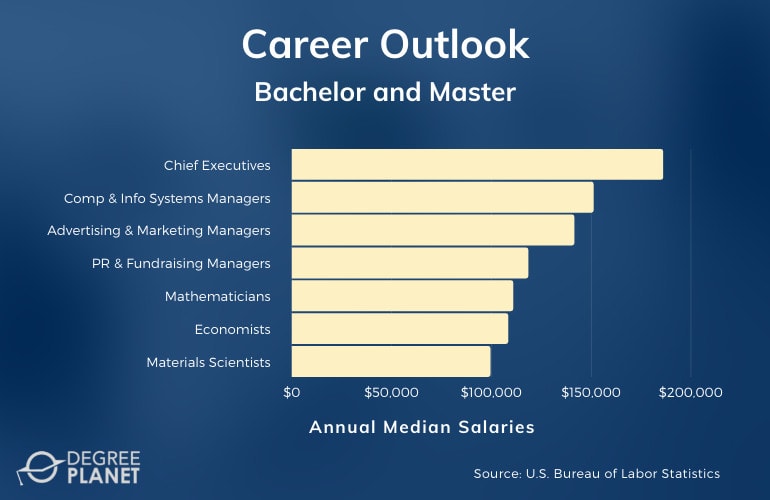
There’s a wide world of jobs out there, and combined bachelors masters programs may help you qualify for the role that’s right for you. Your education can play a big part in what jobs you can pursue, so it’s strategic to match your training to the goals you hope to accomplish.
Many degrees lead to jobs in the business world. That can include corporations, small businesses, or financial institutions. Even nonprofits often need business experts. Technology plays a key role in many industries. Computer or information system experts may work as IT managers or security analysts. Not everyone works for private businesses, though. The government is another major employer.
Law enforcement personnel, such as criminal investigators, are typically hired by local or federal agencies. Criminal justice training could help prepare someone for those types of roles.
No matter what field you’re in, it’s possible that having a degree could help qualify you for leadership roles. According to the Bureau of Labor Statistics, jobs in management pay a median annual salary of $102,450.
| Careers | Annual Median Salaries |
| Chief Executives | $179,520 |
| Computer and Information Systems Managers | $159,010 |
| Advertising, Promotions, and Marketing Managers | $133,380 |
| Public Relations and Fundraising Managers | $119,860 |
| Mathematicians | $108,100 |
| Economists | $105,630 |
| Materials Scientists | $100,090 |
| Detectives and Criminal Investigators | $83,640 |
| Epidemiologists | $78,830 |
| Accountants and Auditors | $77,250 |
Opportunities and salaries can vary based on training and experience. MBA holders may work as managers, such as marketing directors, financial managers, and chief operating executives. Accounting majors may become certified public accountants who work for individuals or companies. Communications degrees can help people become public relations managers.
Like other businesses, manufacturing companies need many of these various professionals, but they also need materials experts. For example, people with experience in chemistry might work as materials scientists. Many economists work for the federal government. Mathematicians and public health epidemiologists may be government employees as well.
Of course, not all jobs for those research-heavy fields are with the government. Private research groups may also hire for those job categories.
Benefits of Dual Bachelors and Masters Degree Programs

Many dedicated admitted students find that earning two degrees is worth the effort. Some top reasons to consider earning a dual bachelors and masters include:
- Building your resume. Choosing a combined program won’t compromise the quality of either of your college degrees. Rather, it’s a strategic way to earn two respectable degrees that could impress hiring committees.
- Graduating workforce-ready. Many advanced jobs and licenses require applicants to have graduate degrees. By completing a joint program, you might meet the educational qualifications right out of college.
- Saving money. Because 8 to 12 of the credits you earn can count toward both of your degrees, you’ll likely spend less money on college than you would by enrolling in two separate programs.
- Saving time. Those dual-credit courses may also cut a year or more off of the time that you’d normally need to spend in graduate school.
- Specializing your studies. A combined degree option may allow you to gain a broad education in your field during your bachelor’s program and then narrow in on a specific area of that field during your graduate studies.
If you find these benefits appealing, then it may be worth considering whether a bachelor’s and master’s combined program could be a good fit for you.
Accelerated Bachelor’s and Master’s Programs Admissions Requirements

Getting into a masters program typically requires a separate application once you’ve completed the majority of your undergraduate study requirements. The requirements may include:
- Essay. You might write about why you’re interested in the combined program.
- GRE scores (if required). This standardized test is required only at some schools.
- Satisfactory grades. You’ll often be required to submit official transcripts that reflect a minimum GPA, often around 3.5.
- Reference letters. Professors or work supervisors may need to attest to your readiness for graduate studies.
Often, only academically strong undergraduate students are admitted to joint programs.
Combined Bachelors and Masters Degrees Accreditation
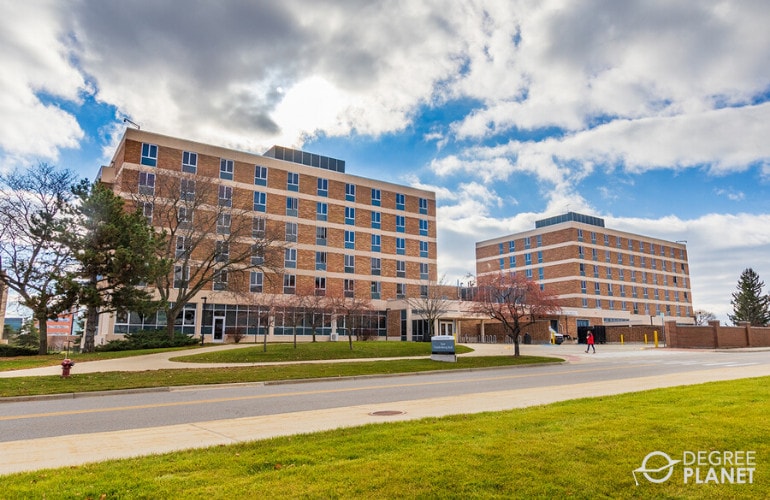
Whether or not a school holds regional accreditation is often a critical factor during the college search. If a college is regionally accredited, then you can count on getting a quality education there.
You can use government financial aid at regionally accredited schools, and you may be able to more easily transfer accredited college credits to other universities. Regional accreditation could also impact your eligibility for a doctoral program or for a job.
Editorial Listing ShortCode:
Your masters program may be housed at the same college as your undergraduate study courses or at a different one. It can be beneficial during your school search to make sure that every institution you attend is regionally accredited.
Financial Aid and Scholarships

Admitted students who qualify may receive financial aid from a variety of sources, including their university, the government, and private sources.
To get started on your financial aid search, you can fill out the Free Application for Federal Student Aid (FAFSA). The FAFSA can determine your eligibility for state and federal assistance, such as grants and loans. Some college programs even offer scholarships to high-achieving students accepted into combined degree programs. Private organizations often give scholarships, too. You may qualify based on your merits, background, or financial need.
Some employers pay for their employees to go to school. If you’re working, you can check with your HR department to see if your company offers tuition assistance. It is possible that your funding eligibility may change from your undergraduate program to your graduate program.
Do You Need a Bachelors to Get a Masters?

As a general rule, you need a bachelor’s degree before you get a master’s degree. Of course, there are some exceptions to that rule. Combined 4+1 programs will allow you to start earning graduate credits before you’ve fully completed your bachelor’s degree.
There are also master’s programs that offer bridge opportunities for people with associate degrees or for students accepted into an undergraduate degree but never completed it. Some schools may even give credit for professional experience and allow it to take the place of an official degree.
Can You Get a Bachelors and a Masters Degree at the Same Time?
Yes, colleges with 4+1 programs allow you to transition smoothly from your undergraduate studies into a master’s program. Some of the classes that you take will provide credit toward both your bachelors and masters degree.
Using these courses for dual credit can often save you both time and money. These 4+1 programs usually shave at least a year off the length of two separate programs. Plus, getting double credit means you may pay tuition for fewer classes.
What Is a Combined Bachelors and Masters Degree?

A bachelor’s and master’s combined degree option is a way to seamlessly earn two related degrees, one right after the other.
First, you’ll spend about 3 years focused on undergraduate coursework. Then, in your fourth year of that program, you’ll typically start taking graduate classes. They can take the place of some of the standard curriculum for your major.
After completing your bachelor’s studies, you’ll spend about 1 more year in college. During that time, you can take the remaining graduate study courses for your combined degree option program. You might also write a thesis or complete a final project.
What Can You Do with a Combined Bachelor’s/Master’s Degree?

People who have earned joint bachelor’s and master’s degrees do all sorts of jobs. Of course, the type of work they do typically depends on their field of study.
For example, MBAs often lead to business management careers. Some professionals with that degree even become company CEOs. Public health degrees could qualify graduates for jobs in epidemiology. Others with joint degrees in that field may direct public health departments or head up health advocacy campaigns.
Editorial Listing ShortCode:
Economics students with both bachelor’s and master’s degrees may become economists. According to the Bureau of Labor Statistics, economists often work for research firms or the government.
How Long Does It Take to Get a Combined Bachelors and Masters Degree Online?
These joint degree arrangements are sometimes called 4+1 programs because they often take 5 years total. Your first 4 years are often dedicated to earning a bachelor’s degree. During your senior year of college, you’ll start taking graduate-level classes that count toward both degrees.
After that, you’ll generally have 1 more year of grad school before receiving your master’s degree. Select programs that require a large number of graduate credits or a thesis may take closer to 6 years. Attending part-time can also add some additional time to completion.
Is a Bachelors a Graduate Degree?

A bachelor’s degree is an undergraduate degree. That level of study provides a broad overview of general knowledge from many different topic areas. It also allows you to begin building expertise in a particular content area, which is considered your major.
Master’s degrees and doctorates are graduate degrees. You can apply for a graduate program after getting a bachelor’s degree. In graduate courses, you’ll build on the foundation that was established during your undergraduate studies.
What’s the Difference Between an Undergraduate vs. Graduate Degree?
During a combined program, you’ll earn both an undergraduate degree and a graduate degree. Here’s how the two differ.
| Undergraduate Degree | Graduate Degree |
|
|
Earning both degrees could help make you a well-prepared candidate for various leadership roles.
Is It Worth It to Earn a Bachelors and Masters at the Same Time?

Yes, earning a bachelors and masters degree at the same time is worth it for many professionals. It’s a commitment that will last for several years, but you can come out on the other end of it with 2 college degrees to your name.
Editorial Listing ShortCode:
According to the Bureau of Labor Statistics, higher education is valuable. The unemployment rate among people with only a high school diploma is 6.2%. Having a bachelor’s degree drops it to 3.5%, and among people with a master’s, the unemployment rate goes down to 2.6% (Bureau of Labor Statistics).
So, though earning a bachelor’s degree is worth it for many students, also earning a master’s at the same time may lead to even more opportunities.
Universities Offering Combined Bachelors and Masters Degree Programs
Methodology: The following school list is in alphabetical order. To be included, a college or university must be regionally accredited and offer degree programs online or in a hybrid format.

American University offers a fast track program for students interested in completing a bachelor’s and master’s degree. Students accepted into the program must have a GPA of 3.0 or higher to be eligible for the fast track program. Applicants must have already completed 75 credit hours toward their bachelor’s degree before applying to the fast track program.
American University is accredited by the Middle States Association of Colleges and Secondary Schools.

Arizona State University offers more than 200 different 4+1 degree programs for those interested in obtaining both a bachelor’s and master’s degree in a subject. Those interested in the program must submit an application to the graduate program in their junior year.
Arizona State University is accredited by the Higher Learning Commission.
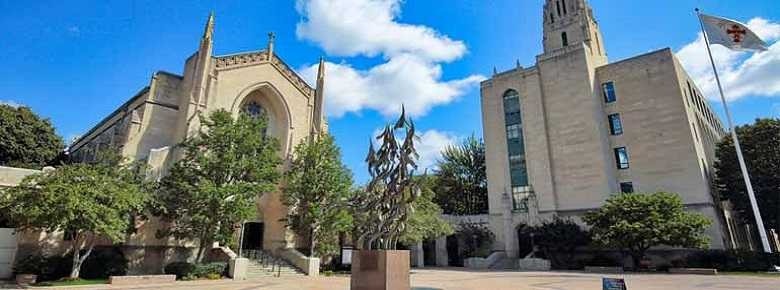
Boston University offers a combined degree program to give students the chance to earn multiple degrees at once. To graduate, students must complete 144 credit hours and have a GPA of 3.0 or higher. Applications to pursue the second degree must be submitted after the applicant’s freshman year.
Boston University is accredited by the New England Commission of Higher Education.

Brown University offers a concurrent bachelor’s and master’s degrees program. Students in the program are expected to spend the last 2 years of their undergraduate program completing courses for both degrees. Those interested in the program must submit an application along with two letters of recommendation from the school’s faculty.
Brown University is accredited by the New England Commission of Higher Education.

California University of Pennsylvania offers 24 different accelerated bachelor’s to master’s programs. Students may register up to 18 credits to apply to both degrees. To be eligible for the program, applicants must have at least 60 credit hours with a GPA of 3.0 or higher and acceptance into their desired graduate program.
California University of Pennsylvania is accredited by the Middle States Commission on Higher Education.

Capella University offers a combined degree program for those interested in achieving both a bachelor’s and a master’s degree. The program gives students the opportunity to finish a master’s degree up to two semesters faster by applying credits to both degrees. Applicants must have 100 quarter-credits with a minimum GPA of 3.0 to be eligible.
Capella University is accredited by the Higher Learning Commission.

Central Michigan University offers an accelerated degree program option for those interested in receiving both a bachelor’s and a master’s degree. Those interested in the program may speak with an academic advisor after they have completed 80 credit hours to check if they are eligible for the program.
Central Michigan University is accredited by the Higher Learning Commission of the North Central Association of Colleges and Schools.

Creighton University offers an accelerated bachelor’s to master’s program. Students in the program are given the opportunity to earn up to 12 credits that are counted toward both a master’s and a bachelor’s degree. Those interested in the program must have a GPA of 3.0 and must speak with an academic advisor.
Creighton University is accredited by The Higher Learning Commission of the North Central Association of Colleges and Schools.

Dallas Baptist University offers an accelerated degree program for those interested in completing a bachelor’s and a master’s degree. Students in the program must maintain a GPA of 3.0 to remain in the program. Applicants must submit a request form to change their program to the accelerated program after they have completed 70 or more credit hours in their bachelor’s program.
Dallas Baptist University is accredited by the Southern Association of Colleges and Schools Commission on Colleges.
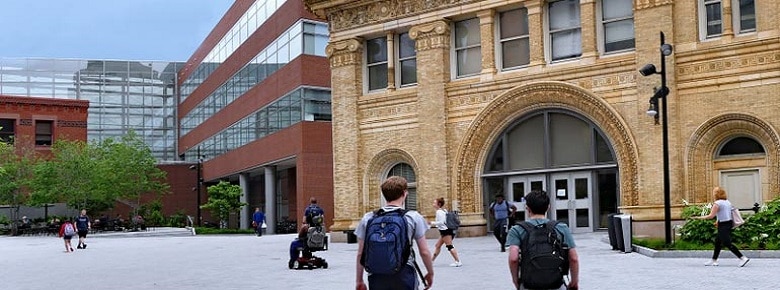
Drexel University offers three different programs for students interested in receiving a bachelor’s and a master’s degree: the accelerated program, the combined program, and the bridge program. Those interested in the programs must express interest in their application. Further admissions material may be expected of the applicant depending on the major chosen.
Drexel University is accredited by the Middle States Commission on Higher Education.

Grand Valley State University offers a combined degree program for students interested in both a bachelor’s and a master’s degree. A second program, called the Student Initiated Combined Degree program, allows students to work towards earning a bachelor’s and a master’s degree in different subjects. Each program has specific admissions requirements. Applications can be submitted through the school’s website.
Grand Valley is accredited by the Higher Learning Commission.

Hofstra University offers a combined degree program designed to help students earn a bachelor’s and a master’s degree at the same time. Those interested in the program must apply for the graduate program after they have already begun their undergraduate degree. Application and credit requirements vary based on the specific combined degree option.
Hofstra University is accredited by the Middle States Commission on Higher Education.
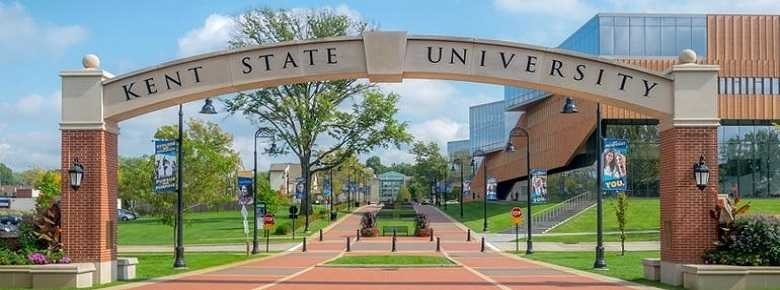
Kent State University offers a combined bachelor’s and master’s degree program. Students in the program can transfer up to 12 qualifying credit hours into the master’s program. Those interested in the program may apply after finishing the first 60 hours of their undergraduate degree with a minimum GPA of 3.0.
Kent State University is accredited by the Higher Learning Commission.

Lesley University offers a dual degree and accelerated master’s program. Students in this combined degree option can potentially complete both a bachelor’s and a master’s degree in 5 years. Those interested in the program must apply in their senior year, with each program having a different minimum GPA requirement.
Lesley University is accredited by the New England Commission of Higher Education.

Stockton University offers four different accelerated dual degree programs for students interested in receiving both a bachelor’s and a master’s degree in a subject. Each program can typically be completed in about 5 years. Admissions requirements vary per program. Applications for the dual degree program may be submitted after starting the undergraduate program.
Stockton University is accredited by the Middle States Commission on Higher Education.

The University of Chicago offers a joint bachelor’s and master’s degree program. Students are admitted into the 5 year or 4 year program based on if they applied during the third or fourth year of their undergraduate degree program. Those interested in the program need to meet with their college advisor for further instruction.
The University of Chicago is accredited by the Higher Learning Commission.
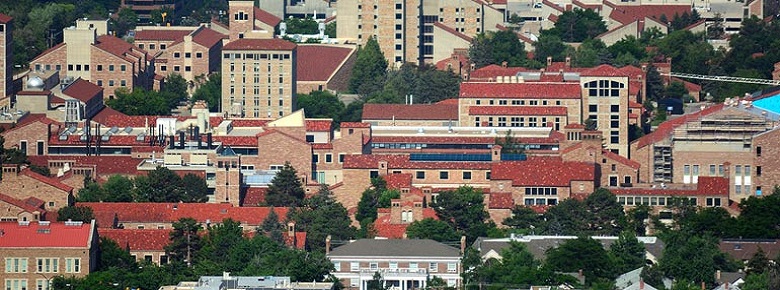
The University of Colorado—Boulder offers a bachelor’s and accelerated master’s dual degree program. Students in the program can count up to 12 qualifying credit hours toward both a bachelor’s and a master’s degree. Applicants must submit a “BAM Intent Application” to the school along with any degree specific requirements.
The University of Colorado Boulder is accredited by the Higher Learning Commission.

The University of Florida offers a combination degree program. The program is designed for students in an undergraduate program who are interested in obtaining a master’s degree. A maximum of 12 qualifying credit hours can be put toward both degrees. Applicants must have a minimum GPA of 3.0 to be eligible for the program.
The University of Florida is accredited by the Southern Association of Colleges and Schools Commission on Colleges.

The University of Miami offers a dual degree program for students looking to obtain both a bachelor’s and a master’s degree. The program can typically be completed in 5 to 6 years, depending on the student’s chosen subject. To be eligible for the program, applicants must already be an undergraduate at the school and meet all requirements set by the specific program of study they are interested in.
The University of Miami is accredited by the Commission on Colleges of the Southern Association of Colleges and Schools.

The University of Washington offers a combined Bachelor of Science and Master of Science program. A maximum of 12 qualifying credits can be transferred to the master’s degree. Those interested in the program should apply one year before they graduate and must have a minimum GPA of 3.0 and a reference from the school.
The University of Washington is accredited by the Northwest Commission on Colleges and Universities.
Getting Your Combined Bachelor’s and Master’s Degree Online

Earning degrees through a combined degree option could be a strategic way to take your career to the next level. Combined degree programs can often save you time and money without compromising on the quality of your studies. Some students feel that combined degree programs lead to the most useful college degrees for their needs.
Online college could be a beneficial option for anyone considering dual undergraduate and graduate programs. Rather than committing 5 years of your life to living on campus or commuting back and forth, you can take college classes and advance your education from the comfort of your own home. A number of universities also offer combined masters programs online, in which you could earn two masters degrees at the same time.
You can check out accredited schools to learn more about your options for earning an online bachelor’s degree combined with a master’s.

